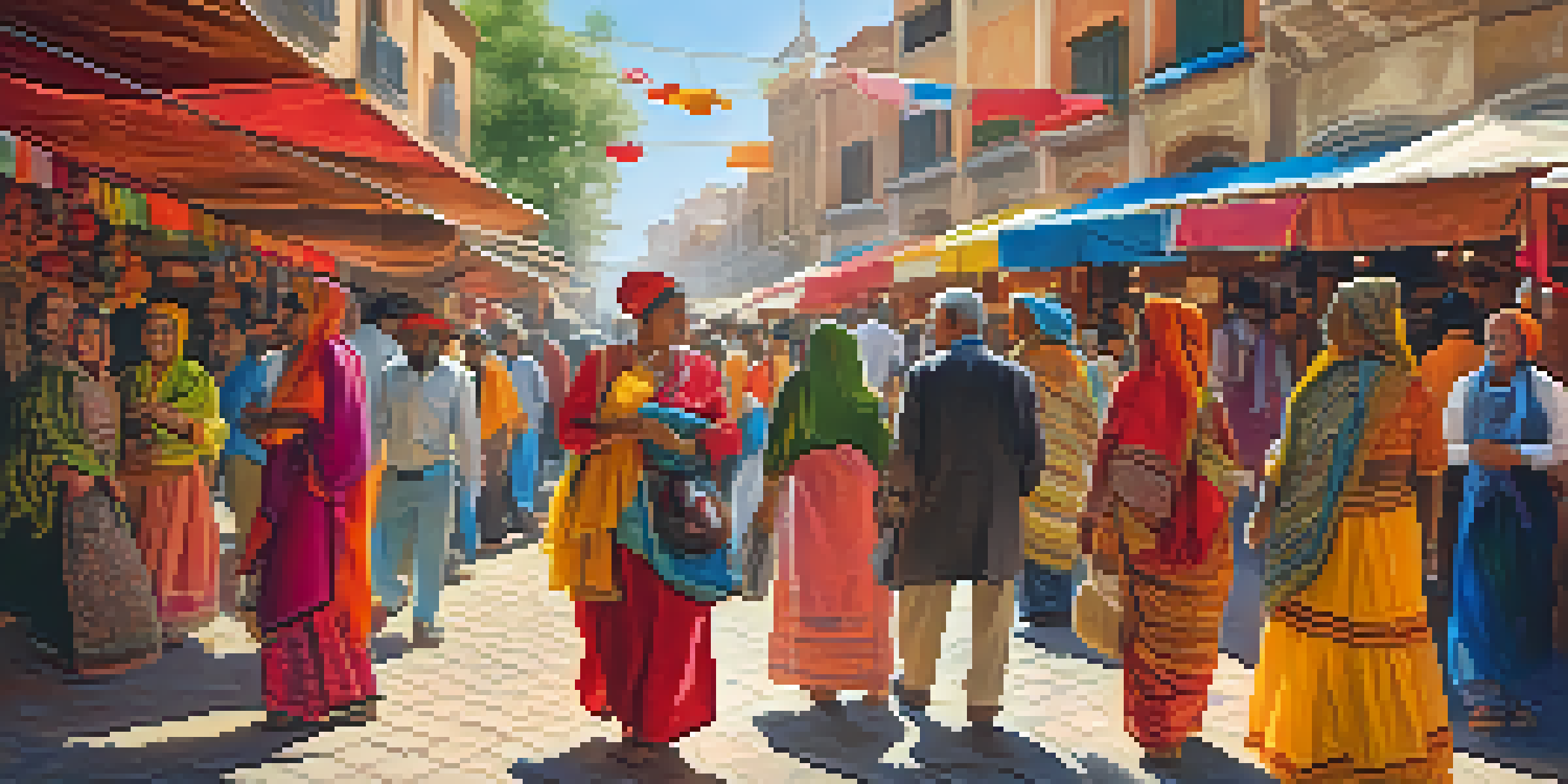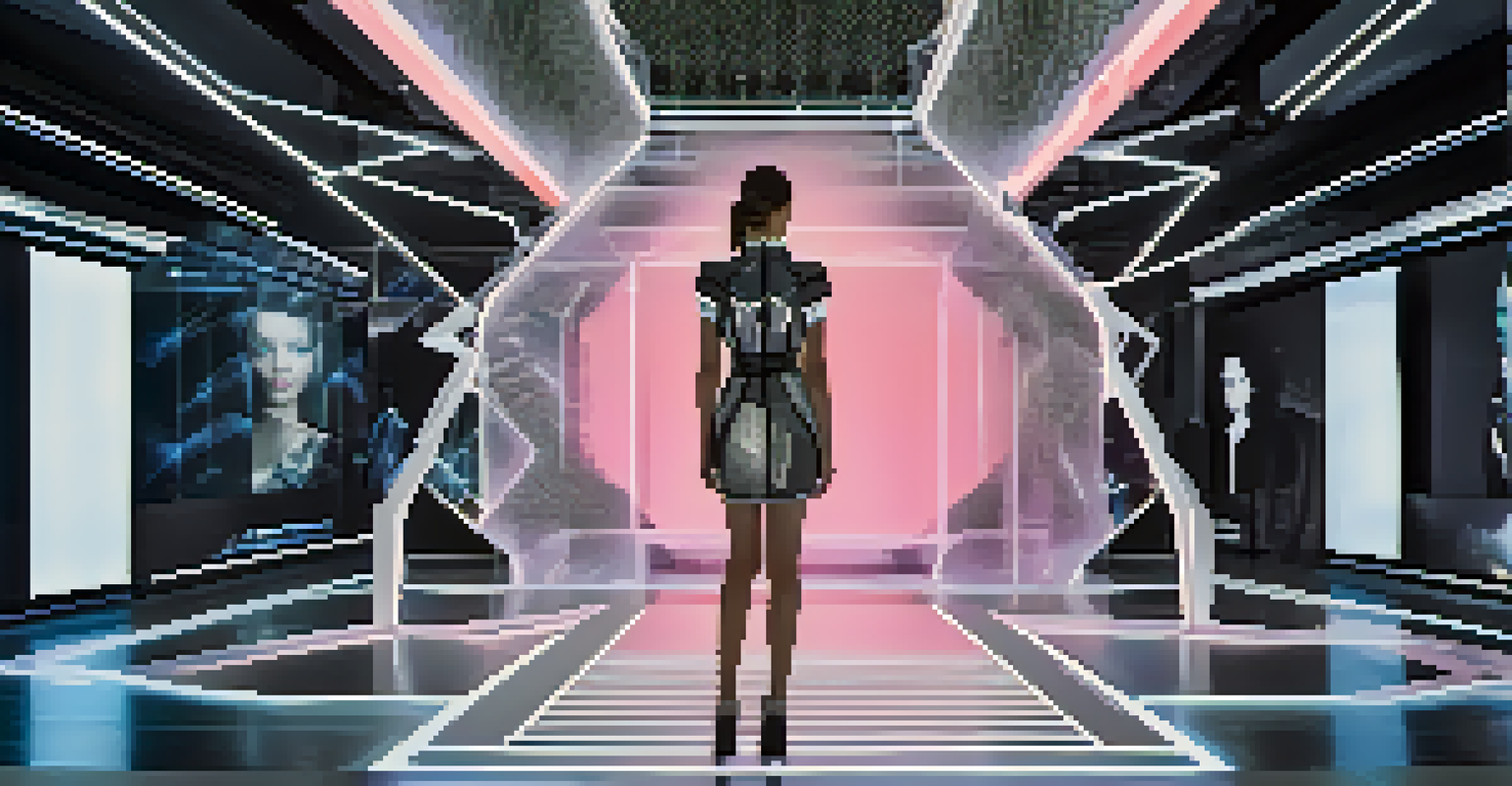The Psychology of Fashion: Identity and Self-Expression

Understanding Fashion as a Reflection of Identity
Fashion isn’t just about clothing; it’s a mirror reflecting who we are. It showcases our individuality and can convey messages about our values and beliefs. Just think about how a simple outfit can signal your mood or aspirations, like wearing bright colors to express joy or darker tones during somber times.
Fashion is the armor to survive the reality of everyday life.
Our choices in fashion often correspond to different aspects of our identities, such as culture, age, or social status. For instance, teenagers might gravitate towards trendy brands to fit in with peers, while older adults may prefer timeless styles that reflect their life experiences. This dynamic interplay illustrates how fashion serves as a powerful tool for self-definition.
Moreover, the way we dress can influence how we perceive ourselves and how others perceive us. Research shows that wearing certain outfits can boost confidence and alter our mindset, enabling us to embody the persona we wish to present to the world. This highlights the profound connection between fashion and our sense of identity.
Fashion as a Medium for Self-Expression
When it comes to self-expression, fashion acts like a blank canvas where we can paint our personalities. Each garment is a brushstroke, telling a story about who we are and what we value. Consider artists, musicians, and influencers who often use their clothing choices to communicate their artistic vision and beliefs.

For many, fashion choices are a way to challenge societal norms and express individuality. Think of punk rockers in their leather jackets and mohawks, or the vibrant colors of the LGBTQ+ pride movement. These styles often defy conventional expectations and make bold statements about identity and personal freedom.
Fashion Reflects Our Identity
Fashion serves as a mirror of our individuality, showcasing our values, culture, and personal experiences.
Additionally, social media has amplified this aspect of fashion, allowing individuals to curate their identities and share their unique styles with the world. Platforms like Instagram enable users to showcase their outfits, inspiring others and fostering a sense of community. This interplay between fashion and self-expression continues to evolve in our digital age.
The Role of Cultural Influences in Fashion Choices
Culture plays a significant role in shaping our fashion choices, providing a rich tapestry of styles that reflect history, tradition, and values. For instance, traditional garments like kimonos or saris tell stories of heritage and pride. Wearing these pieces can evoke a sense of belonging and respect for one’s roots.
Style is a way to say who you are without having to speak.
Furthermore, globalization has led to the blending of various cultural influences in contemporary fashion. It’s not uncommon to see elements of Eastern fashion in Western styles and vice versa. This fusion allows for a broader expression of identity, as individuals can draw inspiration from diverse cultures, creating unique looks that resonate with their personal journeys.
However, this cultural exchange also raises questions about appropriation versus appreciation. It’s important to engage with cultural fashion respectfully, understanding its significance rather than merely adopting it for aesthetic purposes. This awareness can enhance our appreciation for the stories behind the garments we choose.
The Impact of Fashion on Mental Health and Well-Being
Fashion can significantly impact our mental health, serving as a source of confidence or insecurity. When we wear outfits that make us feel good, it can boost our self-esteem and promote a positive mindset. This 'enclothed cognition' phenomenon suggests that the clothes we wear can influence how we feel and act.
On the flip side, societal pressures and unrealistic beauty standards can lead to negative feelings about our appearance. Many individuals struggle with body image issues, often exacerbated by the fashion industry's portrayal of idealized looks. Recognizing these pressures is crucial in fostering a healthier relationship with fashion.
Self-Expression Through Style
Fashion acts as a canvas for self-expression, allowing individuals to communicate their uniqueness and challenge societal norms.
Fortunately, many brands are now embracing body positivity and inclusivity, offering a wider range of sizes and styles that cater to all body types. This shift encourages individuals to embrace their unique beauty, promoting a sense of belonging and acceptance within the fashion community. Ultimately, fashion has the power to uplift or undermine our mental well-being.
The Evolution of Fashion Trends and Their Meaning
Fashion trends are constantly evolving, often reflecting the zeitgeist of society. From the flapper dresses of the 1920s to the grunge styles of the '90s, each era’s fashion encapsulates the prevailing attitudes and emotions of its time. Understanding these trends can provide insight into the cultural and historical context of our society.
Moreover, the cyclical nature of fashion means that past trends often resurface, reinterpreted for modern audiences. This revival of vintage styles can signify nostalgia or a desire to reconnect with simpler times. It showcases how fashion is both a personal and collective journey, shaped by the experiences and memories of generations.
Ultimately, the evolution of fashion trends tells a story about who we are as a society and how we navigate change. By examining these trends, we can better understand our collective identity and the ways in which we express ourselves through clothing.
Sustainable Fashion and Its Role in Identity
In recent years, sustainable fashion has gained traction as consumers become more conscious of their environmental footprint. This shift not only reflects a growing awareness of climate issues but also serves as a form of self-expression for many individuals. Choosing eco-friendly brands can symbolize a commitment to values like sustainability and ethical consumption.
For many, sustainable fashion becomes a statement about identity, showcasing a desire to align personal choices with broader social movements. Wearing second-hand clothing or supporting local artisans can foster a sense of community and connection to the planet. It tells a story of responsibility and care for future generations.
Sustainable Choices Define Us
The rise of sustainable fashion reflects a commitment to ethical consumption and showcases personal values in our clothing choices.
However, the journey towards sustainable fashion is not without its challenges. It requires a conscious effort to break away from fast fashion's allure and embrace a more mindful approach to clothing choices. By prioritizing sustainability, individuals can redefine their identities in a way that reflects their values and aspirations.
The Future of Fashion: Identity and Self-Expression
As we look ahead, the future of fashion appears to be increasingly intertwined with technology and innovation. Virtual reality, 3D printing, and digital fashion are emerging as new mediums for self-expression. This evolution opens up exciting possibilities for individuals to express their identities in unique and imaginative ways.
Additionally, inclusivity and diversity are becoming central themes in the fashion industry, with more brands recognizing the importance of representing all identities. This shift allows for a broader spectrum of self-expression, empowering individuals to celebrate their uniqueness without fear of judgment.

Ultimately, the future of fashion promises to be a vibrant landscape where identity and self-expression continue to flourish. As we embrace new technologies and values, our relationship with clothing will evolve, reflecting the complexities of who we are and who we aspire to be.